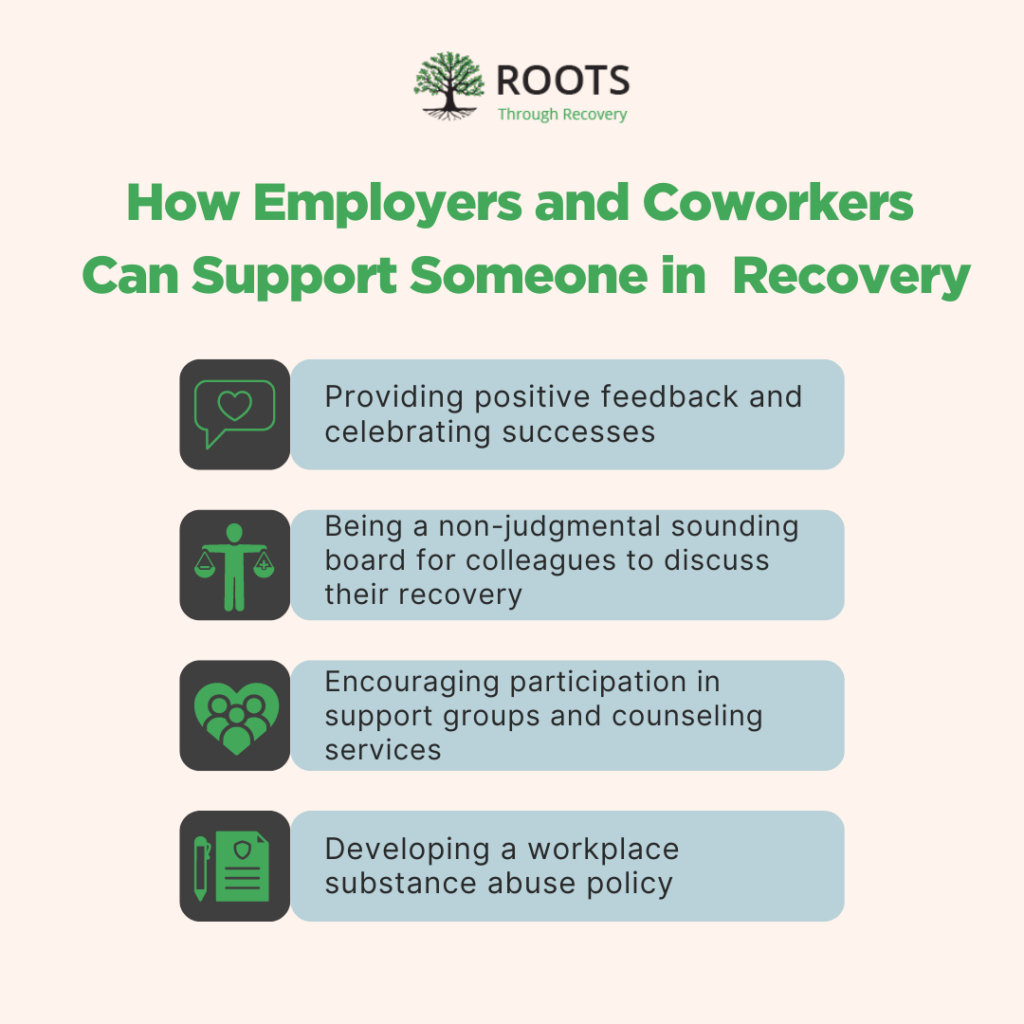Substance abuse in the workplace is a pressing issue that affects employees and organizations. When employees struggle with addiction, their job performance suffers, leading to decreased productivity, increased absenteeism, and even safety hazards.
As a concerned colleague, it’s essential to approach the situation with empathy and support rather than judgment or criticism.
By recognizing the signs of substance abuse and offering non-judgmental assistance, you can help your coworker get the help they need and ensure the success of your organization.

What Is Considered Substance Abuse?
Substance abuse in the workplace can significantly impact job performance and an individual’s overall well-being. That said, identifying the signs of substance abuse can be critical in helping those struggling to seek appropriate treatment. Here are the things to watch out for:
- Physical health issues like liver disease, heart disease, and respiratory problems
- Irreversible damage to vital organs and systems with prolonged substance abuse
- Mental health effects, including mood swings, anxiety, and depression
- Impaired cognitive function, making it difficult to remember things or make sound decisions
What are the Signs of Substance Abuse in the Workplace?
Substance abuse in the workplace can be tricky to navigate, as those with addiction may try their best to hide their behavior. However, these are some common signs and symptoms to watch out for:
- Not getting as much work done as usual or a drop in the quality of work
- Showing up late or calling in sick without an apparent reason
- Changes in mood, behavior, or attitude that seem out of character
- Physical signs like shaking hands, sweaty palms, or bloodshot eyes
- Asking for financial help or advances more frequently than usual
- Not wanting to socialize with coworkers or participate in company events
If you do notice any of these signs, it’s important to approach the situation with kindness and support. Remember, addiction is a complex disease that requires treatment and understanding.
You may try to do these strategies instead to help someone struggling with addiction:
- Educate yourself and your colleagues on the signs and symptoms of addiction
- Create a safe, confidential environment for employees to seek help
- Provide employee assistance programs (EAPs) that offer resources and support for addiction recovery
- Encourage employees to seek professional treatment for substance abuse
What are the Effects of Drug and Alcohol Use in the Workplace?
Addiction is a serious issue that can have far-reaching effects on job performance, from decreased productivity to increased risk of accidents or errors. Employees struggling with addiction may be distracted, fatigued, and unable to perform to their full potential.
While addiction can impact anyone, certain professions may be particularly vulnerable to substance abuse. Manual labor jobs, for instance, may increase the risk of accidents and injuries.
When employees struggle with addiction, their judgment and coordination can be impaired, making them more likely to make mistakes or cause accidents. This not only puts the employee at risk but also endangers their coworkers and can lead to costly legal consequences for the company.

Resources for Addiction Recovery in the Workplace
According to data, 75% of employers have reported that opioid use has impacted their workplace. However, only 17% said they were extremely well-prepared to address the issue.
This should not be the case because various resources are available for addiction recovery in the workplace, including employee assistance programs, counseling services, and support groups.
Learning the correct employee assistance program definition is crucial in supporting employers wanting to overcome substance abuse.
EAPs are employer-sponsored programs that offer confidential resources and support to employees struggling with addiction or other personal issues. They provide a wide range of services, including counseling, referral services, and support groups.
EAPSs are an excellent starting point, but there are other resources to consider as well, such as counseling services and support groups.
Counseling services can be an effective tool for addressing addiction in the workplace. A licensed counselor can provide a safe and confidential environment for employees to talk about their struggles with substance use and work through the underlying issues that contribute to it.
Support groups are another valuable resource for addiction recovery in the workplace. These groups provide a sense of community and belonging for individuals struggling with addiction.
You may also partner with a treatment center for substance abuse – a facility that provides comprehensive treatment programs for individuals struggling with addiction. Treatment centers can be either inpatient or outpatient and may specialize in certain types of addiction, such as alcohol or opioid dependence.
The Role of Employers and Coworkers in Supporting Recovery
Employers and coworkers can play a vital role in supporting recovery for those struggling with substance abuse. Here are some ways that they can help:
- Providing positive feedback and celebrating successes
- Being a non-judgmental sounding board for colleagues to discuss their recovery
- Encouraging participation in support groups and counseling services
- Developing a workplace substance abuse policy that outlines the expectations for employees and the consequences of violating the policy

In conclusion, employers and employees must recognize the indications of substance abuse in the workplace and address it in a supportive and non-judgmental manner.
By prioritizing people’s welfare and fostering a culture of compassion and support, organizations can facilitate healing, recovery, and personal growth. This will enable individuals to overcome addiction and reestablish their lives with renewed vigor and purpose.
If you know someone struggling with substance abuse, Roots Through Recovery is here to help. Contact us to learn about our outpatient treatment programs and start your journey toward recovery. Call us at (562) 247-3520 to schedule a consultation with one of our experienced professionals.


